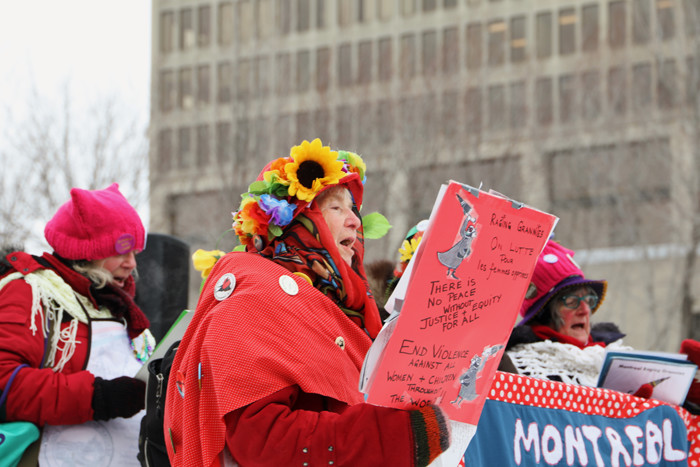On Jan. 19, the Manif des Femmes Montréal, or Women’s March of Montreal, returned for a third year as part of the International Women’s March. Despite temperatures of negative 24 degrees celsius, Montrealers gathered at Place Émilie Gamelin to participate in a rally and take a collective stand against violence towards women.
The first march, held in 2017, was largely in response to Donald Trump’s inauguration and its impact on women’s rights globally. In 2018, the conversation shifted to the emerging #MeToo movement, focusing on those excluded from the conversation on sexual misconduct and recognizing the importance of diversity and equality within feminist movements. This year’s march continued to strive for intersectionality between movements while also expanding the discussion to include victims of domestic or systemic abuse.
Sarah Barone, one of the march’s organizers, reached out to local groups that work with survivors of violence to ensure that their testimonies were heard.
“At the marches this year, we will collectively put a foot down and bring awareness to the prevalence of violence in our communities,” Barone said. “We, in Montreal, are working to intersect this global discussion with our local advocacy groups, culture workers, and organizations that are out there in our community, everyday, trying to recognize what violence is and can be.”
Georgette Pascual, another organizer of the march, shared statistics about the disturbingly-high number of female victims of violence and noted the prevalence of abuse among the march’s attendees.
“One out of three women experience violence in their lifetime,” Pascual said. “Raise your hand if you have been a victim of domestic or systematic violence, mental or emotional abuse, physical or verbal abuse, virtual abuse, financial abuse. Look around you. Each hand is one too many.”
The Native Women’s Association suggested that participants of the march wear a red scarf to raise awareness for the disproportionate violence that indigenous women and two-spirit peoples face in Canada. An assortment of handmade signs and dozens of red scarves populated the crowd. Laura Camille Cyr, a law student at the Université de Sherbrooke, explained her decision to don a scarf.
“Whilst the government says it’s trying to provide support, it’s not doing enough for these women, and, therefore, our show of solidarity today is crucial,” Cyr said.
Due to the unforgiving temperatures, organizers of the march suggested postponing it until a later, warmer date. A poll on Facebook, however, showed that an overwhelming majority voted to uphold the original plan and face the cold. Explaining her decision to march in spite of the low temperatures, Cyr expressed that women should strive for equality no matter the weather.
“We constantly say to the people around us that we are providing a voice for women’s rights, but we also have to match what we say with action, and today is no exception,” Cyr said. “The least we can do is to be out here in the cold for a few hours when women’s rights are being repressed.”
Reflecting on previous iterations of the march and thinking forward to next year, Barone highlighted the importance of continuing to expand the focus to include more women who have previously been excluded from the discussion on equality.
“That’s what’s great about shifting the conversation every year, you can open doors to more people in the community you didn’t know about and more people who can help us write more inclusive definitions of these words,” Barone said.








